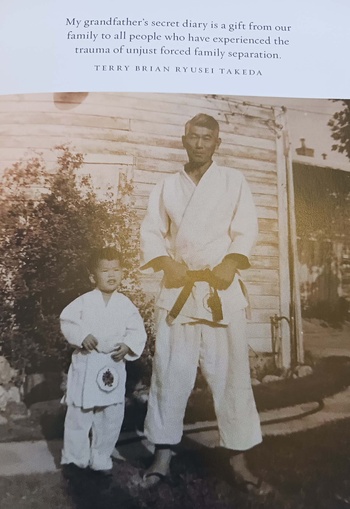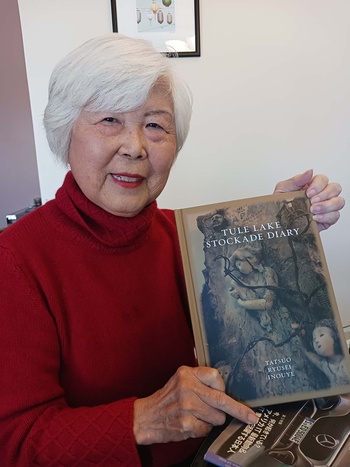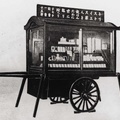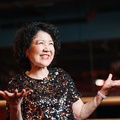Father's camp diary published as book
The Camp Wall, scheduled for completion in 2026 in Columbia Park in Torrance, is a memorial that will inscribe the names of all those who were interned in internment camps across the United States during World War II. Kyoko Oda, whom I met while covering the Camp Wall project, was born in Tule Lake Internment Camp in May 1945, near the end of the war.

Kyoko's father, Tatsuo, was a second-generation Japanese American from Kumamoto Prefecture, and her mother was a third-generation Japanese American. While many Japanese Americans and Japanese people had their property confiscated and were sent to internment camps, Kyoko's family was lucky enough to be able to return to their home in East Los Angeles.
"My father ran the Inouye Grocery Store in East Los Angeles. I heard that the large house in East Los Angeles where my family lived was purchased for $2,000 in 1930 from the previous Japanese owner, who was returning to Japan and wanted us to buy it from him in cash. My parents and two older sisters lived in the house. While my family was in the internment camps, the Mexican Gomez family looked after the house, so we were able to live in it again."
Like many Japanese parents, Kyoko's father, Tatsuo, was very education-conscious. His father, who changed jobs from running a grocery store to being a gardener, used the money he earned to send Kyoko to the private Melnor Catholic School and to extracurricular lessons, including Japanese language. Kyoko saw her father as a "typical Japanese man."
"I remember coming home from work every day and changing into a yukata. My father returned to the United States from Kumamoto to teach judo, and met my mother in Lancaster, a suburb of Los Angeles."
After Kyoko entered UCLA, she learned that her father had kept a diary in the internment camp, and based it on which she published a book called "Tule Lake Stockade Diary" in 2020. "The book conveys how, despite choosing to remain in America, the second generation of Japanese who returned to America suffered severe trauma from the unfair treatment they received from the country during the war. My father's experience in the internment camps made him disappointed in the United States, a country that had caused him such suffering."
Responsibility to pass on
Kyoko was born in an internment camp and left when she was five months old, so naturally she has no memory of the internment of Japanese Americans. However, through her father's diary, she began to feel that "the U.S. government's policy of sending Japanese Americans to internment camps was unnecessary, and that it simply caused suffering for many people." For this reason, she emphasizes, it is important to pass on the story of that unfair experience to future generations.
Her sense of justice was also reflected in her choice of career.
"After graduating from UCLA, I chose to become a teacher, a job that guides the younger generation. Perhaps this was in response to my father's expectations (that I be involved in educating the children who will create America's future). By the way, my name, Kyoko, is written in kanji as "kyoko," which means cooperation. My father gave me that name with the hope that I would "cooperate with people." Also, a teacher's job is to bring many children together and get them to work together, so in that sense I think the name suits me."
Later, Kyoko met Kanji Sahara, the initiator of the Camp Wall project, at a meeting of the Tuna Canyon Detention Station Coalition (the Tuna Canyon Detention Station was a temporary detention facility in Southern California where Japanese Americans in the area were held as enemy aliens. The Tuna Canyon Detention Station Coalition is a non-profit organization established primarily by people who had been detained at the facility). She and Kanji share something in common: they were both detained at the Tule Lake internment camp where Kyoko was born.
"Standing up for others"
Kyoko vividly remembers when Kanji first began talking about his idea for a park that would promote the importance of peace: "He's a big thinker. He expanded on the idea of a peace park and gave a presentation with specific ideas, such as building a three-story museum inside the park. Eventually, this transitioned into a project for the Camp Wall to be built in Torrance's Columbia Park."
The Camp Wall committee welcomed Nancy Hayata, whom Kyoko had known for some time through a Japanese American organization in the San Fernando Valley, to the committee. Currently, Nancy is the leader, taking over from the elderly Kanji.
Kyoko had this to say about the challenges remaining at Camp Wall:
"It is for our group to become more united and continue to move forward. Kanji has put into words his dream of recording the names of all those who were sent to the camps, and he is working to make that dream a reality. I believe in justice and humanity. The Camp Wall is a symbol of the fight for that justice and humanity. My motto is 'standing up for others,' so completing the Camp Wall is my final challenge. With the completion of the Camp Wall, we are fulfilling our mission of conveying a history that must never be repeated in this world."
© 2024 Keiko Fukuda











